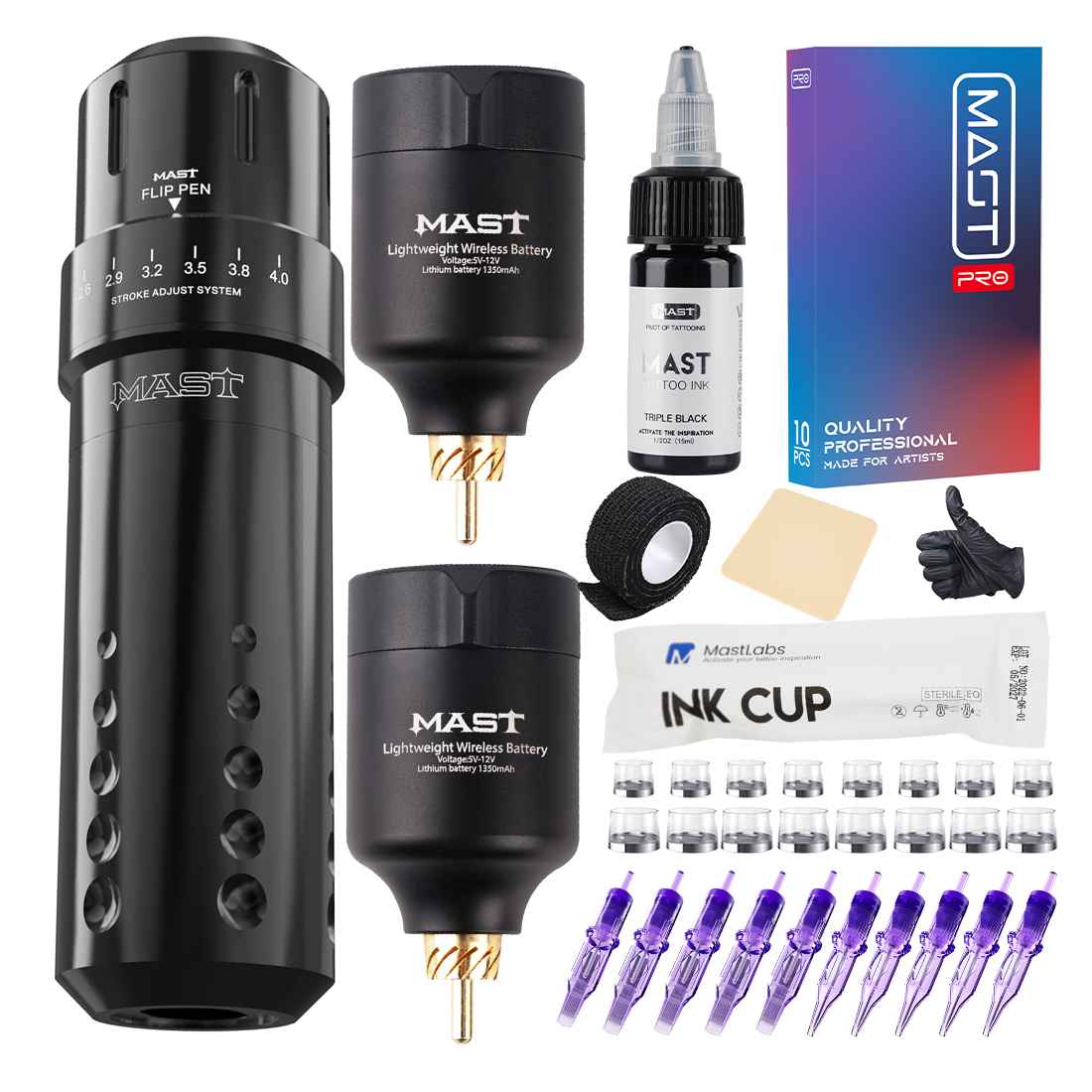Tattoos have become increasingly popular in recent years, with many individuals choosing to express their individuality and personal style through body art.
While tattoos are predominantly seen as a form of self-expression and creativity, they can also have certain medical implications.
In this article, we will explore the medical reasons for getting a tattoo, the health considerations associated with tattoos, and some of the medical benefits they can provide.
Additionally, we will discuss the process of tattoo removal and the medical aspects one should consider.
So, are there Medical reasons for getting a tattoo? Let’s find out.
Understanding Tattoos
What is a tattoo?
A tattoo is a permanent design or artwork that is created by injecting ink into the dermis layer of the skin using a needle.
It involves puncturing the skin repeatedly to deposit pigments that form the desired design.
Tattoos can vary in size, color, and complexity, and they can be placed on different parts of the body.
Also Read: Can tattoo cause infection? Find out
The process of getting a tattoo
Getting a tattoo involves several steps.
First, the tattoo artist consults with the client to understand their desired design and location.
Then, the artist prepares the equipment, which includes sterilizing the needle and ensuring a clean working environment.
Next, the artist outlines the design on the skin and begins the tattooing process, carefully injecting the ink into the skin.
Finally, the artist cleans the tattooed area and provides aftercare instructions to ensure proper healing.
Also Read: Do You Lose Blood During a Tattoo?
Health Considerations for Tattoos
While tattoos are generally considered safe, there are certain health considerations that individuals should be aware of before getting inked.
1. Allergies and sensitivities
Some people may be allergic or sensitive to certain tattoo pigments.
Allergic reactions can range from mild irritation and redness to more severe symptoms such as swelling, rashes, or even anaphylaxis in rare cases.
It’s important to consult with a professional tattoo artist and disclose any known allergies or sensitivities to avoid complications.
2. Skin infections
Tattoos involve breaking the skin barrier, which increases the risk of infection.
Infections can occur if proper hygiene and aftercare instructions are not followed.
Common symptoms of a tattoo infection include redness, swelling, warmth, and the presence of pus.
If an infection is suspected, it is essential to seek medical attention promptly.
3. Bloodborne diseases
When getting a tattoo, it is crucial to ensure that sterile needles and equipment are used to minimize the risk of bloodborne diseases such as hepatitis B, hepatitis C, and HIV.
Reputable tattoo studios follow strict hygiene practices and use disposable needles and single-use ink to maintain a safe environment.
4. Scarring and keloids
In some cases, the tattooing process can lead to scarring or the formation of keloids.
Scarring occurs when the skin heals in an irregular manner, resulting in raised or indented areas.
Keloids are the overgrowth of scar tissue beyond the boundaries of the original tattoo.
Individuals with a tendency to form keloids should consult with a dermatologist or a tattoo artist experienced in working with such conditions.
5. MRI complications
Magnetic Resonance Imaging (MRI) is a commonly used medical imaging technique.
However, some tattoo pigments contain metallic components that can interact with the MRI’s magnetic field, causing discomfort or burns.
It is crucial to inform healthcare professionals about any tattoos before undergoing an MRI to ensure safety and prevent any potential complications.
Also Read: Can a Tattoo Needle Hit Bone?
Medical Beneits of Tattoos
Beyond the realm of self-expression, tattoos can serve practical medical purposes in certain situations.
1. Medical alert tattoos
Medical alert tattoos are used to communicate important medical information in case of emergencies.
These tattoos typically include symbols or text indicating conditions such as allergies, diabetes, epilepsy, or the presence of medical devices like pacemakers.
Medical professionals are trained to look for such tattoos during emergency situations to provide appropriate care quickly.
2. Areola reconstruction tattoos
For individuals who have undergone mastectomies or breast reconstruction surgeries, areola reconstruction tattoos can be a valuable option.
These tattoos recreate the appearance of a natural areola and nipple complex, contributing to a more complete and aesthetically pleasing outcome.
3. Cosmetic tattoos for vitiligo and alopecia
Vitiligo, a skin condition characterized by depigmented patches, and alopecia, hair loss, can significantly impact an individual’s self-esteem.
Cosmetic tattoos can help restore the appearance of pigmentation in vitiligo-affected areas and create the illusion of eyebrows or hair in alopecia-affected individuals.
4. Nipple and areola complex tattoos for breast reconstruction
Following a mastectomy, breast reconstruction can be an important step in the physical and emotional recovery process.
Nipple and areola complex tattoos can provide the finishing touch, enhancing the natural appearance of the reconstructed breast and helping individuals regain their confidence.
5. Scar camouflage tattoos
Tattoos can be used as a form of scar camouflage to conceal or minimize the appearance of scars.
Whether it’s a surgical scar or an injury-related scar, skilled tattoo artists can work with clients to design tattoos that blend with the surrounding skin, effectively reducing the visibility of scars and helping individuals feel more confident about their appearance.
Also Read: What Happens if a Tattoo Needle Goes Too Deep?
6. Radiation therapy tattoo markers
During radiation therapy for cancer treatment, precise targeting is crucial.
Small tattoo markers are often used to help align and guide the radiation beams accurately.
These tiny reference tattoos serve as permanent markers that ensure consistent and precise treatment delivery, reducing the chances of errors and enhancing the effectiveness of radiation therapy.
7. Acupressure and acupuncture tattoos
Acupressure and acupuncture are alternative medicine practices that involve applying pressure or inserting thin needles into specific points on the body to alleviate pain or promote overall well-being.
Some individuals opt for acupressure or acupuncture tattoos, where specific points are tattooed for a prolonged stimulation effect.
This allows for ongoing therapy without the need for regular visits to an acupuncturist or acupressurist.
8. Lymphedema management tattoos
Lymphedema is a condition characterized by the swelling of limbs due to impaired lymphatic drainage.
In certain cases, tattooing can play a role in managing lymphedema.
By tattooing small, intricate patterns known as “lymphedema tattoos” over affected areas, individuals can create a visual distraction, diverting attention away from the swelling and helping improve body image and self-esteem.
9. Mental health support tattoos
Tattoos can also have a positive impact on mental health by serving as symbols of resilience, empowerment, or personal significance.
For individuals struggling with mental health conditions such as anxiety, depression, or trauma, getting a tattoo can be a therapeutic experience.
The process of choosing a design, the symbolism behind it, and the act of self-expression through body art can contribute to a sense of healing, self-acceptance, and personal growth.
10. Parkinson’s disease symptom management tattoos
For individuals with Parkinson’s disease, a neurological disorder that affects movement and coordination, tattoos can be used as a form of symptom management.
By tattooing lines or dots on specific areas of the body, known as “Parkinson’s tattoos,” individuals can improve their motor control and reduce tremors.
These tattoos provide a visual cue that helps the brain focus on movement, making daily tasks more manageable.
11. Diabetes management tattoos
Diabetes requires regular monitoring of blood glucose levels. Some individuals with diabetes opt for medical alert tattoos that include their blood type and the statement “Diabetic” to inform others about their condition.
Additionally, some advanced tattoo technologies are being developed to monitor glucose levels directly from the skin, eliminating the need for traditional glucose monitoring devices.
12. Pain management tattoos
Tattoos can have a pain-alleviating effect through the gate control theory of pain. The process of getting a tattoo involves mild to moderate pain, which can trigger the body’s natural pain-relief mechanisms.
This release of endorphins and adrenaline during the tattooing process can temporarily reduce pain perception and provide relief for individuals with chronic pain conditions.
13. Migraine management tattoos
For individuals who experience chronic migraines, certain tattoo techniques can be used to create “migraine relief tattoos.”
These tattoos involve specific patterns or designs that, when visually focused on during a migraine episode, can help distract from the pain and provide a sense of relief.
While the exact mechanisms are not fully understood, the visual stimulation from the tattoo can potentially modulate the brain’s perception of pain.
14. Anxiety and PTSD support tattoos
Tattoos can serve as a therapeutic tool for individuals with anxiety disorders or post-traumatic stress disorder (PTSD).
Symbolic tattoos or quotes with personal significance can act as a constant reminder of strength, resilience, or a coping mechanism.
The presence of these tattoos can provide comfort and a sense of grounding during moments of anxiety or flashbacks, promoting emotional well-being.
These medical benefits demonstrate the versatility and potential impact of tattoos on various aspects of health and wellness.
It’s important to note that individual experiences and outcomes may vary, and consulting with healthcare professionals or specialists in the respective fields is recommended for personalized advice and guidance.
Also Read: Is it safe to get a tattoo if I have a medical condition?
Tattoo Removal and Medical Considerations
While tattoos are meant to be permanent, there are various methods available for tattoo removal.
However, it is essential to consider the medical aspects associated with tattoo removal procedures.
1. Laser tattoo removal
Laser tattoo removal is a common method that uses laser technology to break down the tattoo pigments into smaller fragments, which are then gradually eliminated by the body’s immune system.
However, not all tattoos can be completely removed, and multiple sessions may be required.
Individuals with certain medical conditions or skin types may not be suitable candidates for laser tattoo removal and should consult a dermatologist for personalized advice.
2. Surgical tattoo removal
Surgical tattoo removal involves physically excising the tattooed skin. This method is typically used for small tattoos and may result in scarring.
It is generally recommended for individuals who are not suitable candidates for laser tattoo removal due to various factors, such as tattoo size, color, or location.
Also Read: Can a tattoo needle hit a nerve?
Conclusion
There you have folks, we’ve covered the question, “Are there Medical reasons for getting a tattoo?” and I’ve also covered 14 amazing medical reasons for getting a tattoo that you probably never knew.
In conclusion, thanks attoos can have both aesthetic and medical implications. While some individuals get tattoos solely for self-expression and creativity, others may benefit from their medical applications.
From medical alert tattoos to cosmetic and reconstructive purposes, tattoos can serve as powerful tools in enhancing self-confidence and providing important medical information.
However, it is crucial to consider the potential health risks associated with tattoos, such as allergies, infections, and bloodborne diseases.
Additionally, when contemplating tattoo removal, one should be aware of the medical considerations involved in the process.
Ultimately, the decision to get a tattoo should be made after careful consideration and consultation with professionals in the field.
FAQs
Can tattoos interfere with medical procedures?
In some cases, tattoos can interfere with certain medical procedures, particularly those involving imaging techniques like MRI.
It is important to inform healthcare professionals about any tattoos beforehand to ensure safety and prevent potential complications.
Are there any medical conditions that may prevent someone from getting a tattoo?
Yes, certain medical conditions may make it unsafe or unsuitable for an individual to get a tattoo.
These conditions can include uncontrolled diabetes, compromised immune system, bleeding disorders, allergies to tattoo ink components, and active skin infections.
It is recommended to consult with a healthcare professional before getting a tattoo if you have any pre-existing medical conditions.
How long should I wait after a medical procedure before getting a tattoo?
The waiting time may vary depending on the type of medical procedure and individual healing factors.
It is advisable to consult with your healthcare provider or surgeon to determine the appropriate waiting period before getting a tattoo after a medical procedure.
Are tattoo inks safe?
Tattoo inks are regulated to meet certain safety standards, but the safety of individual tattoo inks can vary.
It is essential to choose a reputable tattoo artist who uses high-quality, sterile tattoo inks to minimize the risk of adverse reactions or complications.
If you have concerns about specific tattoo inks, you can discuss them with your tattoo artist or seek advice from a dermatologist.
Can tattoos cause cancer?
There is no conclusive scientific evidence to suggest that tattoos directly cause cancer.
However, it is essential to prioritize safety when getting a tattoo by choosing a professional and hygienic tattoo studio that follows proper sterilization practices.
Regular skin checks and monitoring for changes in tattooed areas are also recommended to detect any potential skin abnormalities early on.






